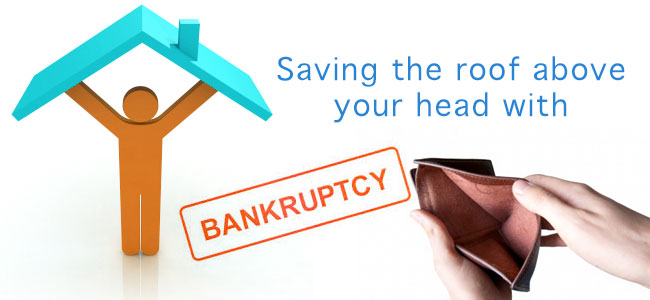Bankruptcy is supposed to be the ultimate debt relief option for an individual. It's true that it creates a huge dent in your credit score. Yet in some cases, bankruptcy can actually be helpful. Debtors, who are facing foreclosure may be able to save their home by picking bankruptcy as their debt-relief option. Read along to know how bankruptcy can help you to hold off or avoid foreclosure.
When does a debtor face foreclosure?
A debtor faces foreclosure only if he's unable to keep up with the regular payments on his or her mortgaged property. A foreclosure would mean that the debtor may lose the house, since the lender tries to recover the outstanding dues by forcing the sale of the collateral, i.e. the property.
Well, you won't be dealing with a foreclosure immediately after you miss your first mortgage payment. Foreclosure notice is only issued after you miss consecutive mortgage payments, around 3 to 4 at the minimum. And it's a time consuming process.
There might be other ways to avoid a foreclosure too. You may try to have a discussion with your lender, opt for loan forbearance or modification, short sale or deed in lieu of foreclosure etc. If none of these options work, then bankruptcy might be the optimum choice for you to save the roof above your head.
How bankruptcy can slow down your foreclosure?
The automatic stay is a great help for the debtors facing foreclosure on their property. It's helpful since the creditors are prevented from continuing with any form of collection attempt, immediately after the debtor files for bankruptcy.The court order can thus automatically bring a halt to the foreclosure process. As a result, the sale of the property is put on hold for a temporary time period at least. It can usually be for around 2 months or more, depending on the time that the lender takes to file a motion to remove the automatic stay.
When does the automatic stay fail to postpone foreclosure?
The mortgage lender may try to obtain permission, also known as the 'order' from the bankruptcy court to proceed with the sale of the collateral. Usually bankruptcy can help a debtor to legally postpone the foreclosure sale, at least for 2 months. The time period for the automatic stay can exceed if the lender is negligent enough or is slow in pursuing the motion to lift the automatic stay.
Again, the automatic stay may not actually be helpful, if the foreclosure notice has already been issued prior to the bankruptcy filing. Most states usually require the foreclosure notice to be sent in advance. In that case, the time period for automatic stay will not be considered, and the lender would be allowed by the court to lift the stay order and continue with the sale after the notice period elapses.
What difference does Chapter 7 and Chapter 13 make during foreclosure?
A Chapter 7 bankruptcy is usually not of much help if you're facing a foreclosure. It's true that it may delay the process. However, eventually it ends with the liquidation of most assets including the mortgaged property.
Chapter 13 bankruptcy, on the other hand, can actually be of assistance if you want to save your home. It can include your late or unpaid mortgage payments in your repayment plan, and allows you to pay it off gradually over a duration of 3 to 5 years. As secured debt, mortgage dues are usually paid off first by the bankruptcy trustee, and if you continue with the regular payments, you won't lose your home at all. Even your 2nd or 3rd mortgages might be treated as unsecured debts if the first mortgage is secured by the entire property value. In that case, they may lose priority as unsecured debts and if your financial condition doesn't permit, you won't need to pay for them.









